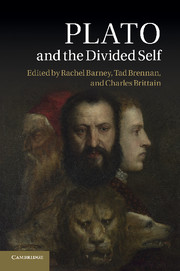24 results
Chapter 2 - The Ciceronian Dialogue
-
-
- Book:
- The Cambridge Companion to Cicero's Philosophy
- Published online:
- 08 December 2021
- Print publication:
- 16 December 2021, pp 25-42
-
- Chapter
- Export citation
Chapter 2 - Deinos (Wicked Good) at Interpretation (Protagoras 334–48)
-
-
- Book:
- Rereading Ancient Philosophy
- Published online:
- 08 December 2017
- Print publication:
- 28 December 2017, pp 32-59
-
- Chapter
- Export citation
Chapter 17 - Peripatetic Appropriations of Oikeiōsis
-
-
- Book:
- From Stoicism to Platonism
- Published online:
- 24 March 2017
- Print publication:
- 13 February 2017, pp 322-347
-
- Chapter
- Export citation
Chapter 1 - Cicero’s sceptical methods
-
-
- Book:
- Cicero's <I>De Finibus</I>
- Published online:
- 05 December 2015
- Print publication:
- 15 December 2015, pp 12-40
-
- Chapter
- Export citation
Contents
-
- Book:
- Plato and the Divided Self
- Published online:
- 05 March 2012
- Print publication:
- 16 February 2012, pp v-vi
-
- Chapter
- Export citation
Introduction
-
-
- Book:
- Plato and the Divided Self
- Published online:
- 05 March 2012
- Print publication:
- 16 February 2012, pp 1-6
-
- Chapter
- Export citation

Plato and the Divided Self
-
- Published online:
- 05 March 2012
- Print publication:
- 16 February 2012
Bibliography
-
- Book:
- Plato and the Divided Self
- Published online:
- 05 March 2012
- Print publication:
- 16 February 2012, pp 368-382
-
- Chapter
- Export citation
Plato and the Divided Self - Title page
-
-
- Book:
- Plato and the Divided Self
- Published online:
- 05 March 2012
- Print publication:
- 16 February 2012, pp iii-iii
-
- Chapter
- Export citation
Part IV - Parts of the soul in the Platonic tradition
-
- Book:
- Plato and the Divided Self
- Published online:
- 05 March 2012
- Print publication:
- 16 February 2012, pp 309-367
-
- Chapter
- Export citation
Part II - Moral psychology in the Republic
-
- Book:
- Plato and the Divided Self
- Published online:
- 05 March 2012
- Print publication:
- 16 February 2012, pp 75-208
-
- Chapter
- Export citation
Copyright page
-
- Book:
- Plato and the Divided Self
- Published online:
- 05 March 2012
- Print publication:
- 16 February 2012, pp iv-iv
-
- Chapter
- Export citation
Part III - After the Republic
-
- Book:
- Plato and the Divided Self
- Published online:
- 05 March 2012
- Print publication:
- 16 February 2012, pp 209-308
-
- Chapter
- Export citation
General index
-
- Book:
- Plato and the Divided Self
- Published online:
- 05 March 2012
- Print publication:
- 16 February 2012, pp 393-396
-
- Chapter
- Export citation
Index locorum
-
- Book:
- Plato and the Divided Self
- Published online:
- 05 March 2012
- Print publication:
- 16 February 2012, pp 383-392
-
- Chapter
- Export citation
Part I - Transitions to tripartition
-
- Book:
- Plato and the Divided Self
- Published online:
- 05 March 2012
- Print publication:
- 16 February 2012, pp 7-74
-
- Chapter
- Export citation
Acknowledgements
-
- Book:
- Plato and the Divided Self
- Published online:
- 05 March 2012
- Print publication:
- 16 February 2012, pp xi-xii
-
- Chapter
- Export citation
CONTRIBUTORS
-
-
- Book:
- Plato and the Divided Self
- Published online:
- 05 March 2012
- Print publication:
- 16 February 2012, pp vii-x
-
- Chapter
- Export citation
Plato and the Divided Self - Half title page
-
- Book:
- Plato and the Divided Self
- Published online:
- 05 March 2012
- Print publication:
- 16 February 2012, pp i-ii
-
- Chapter
- Export citation
Chapter 5 - Antiochus’ epistemology
-
-
- Book:
- The Philosophy of Antiochus
- Published online:
- 05 March 2012
- Print publication:
- 02 February 2012, pp 104-130
-
- Chapter
- Export citation



